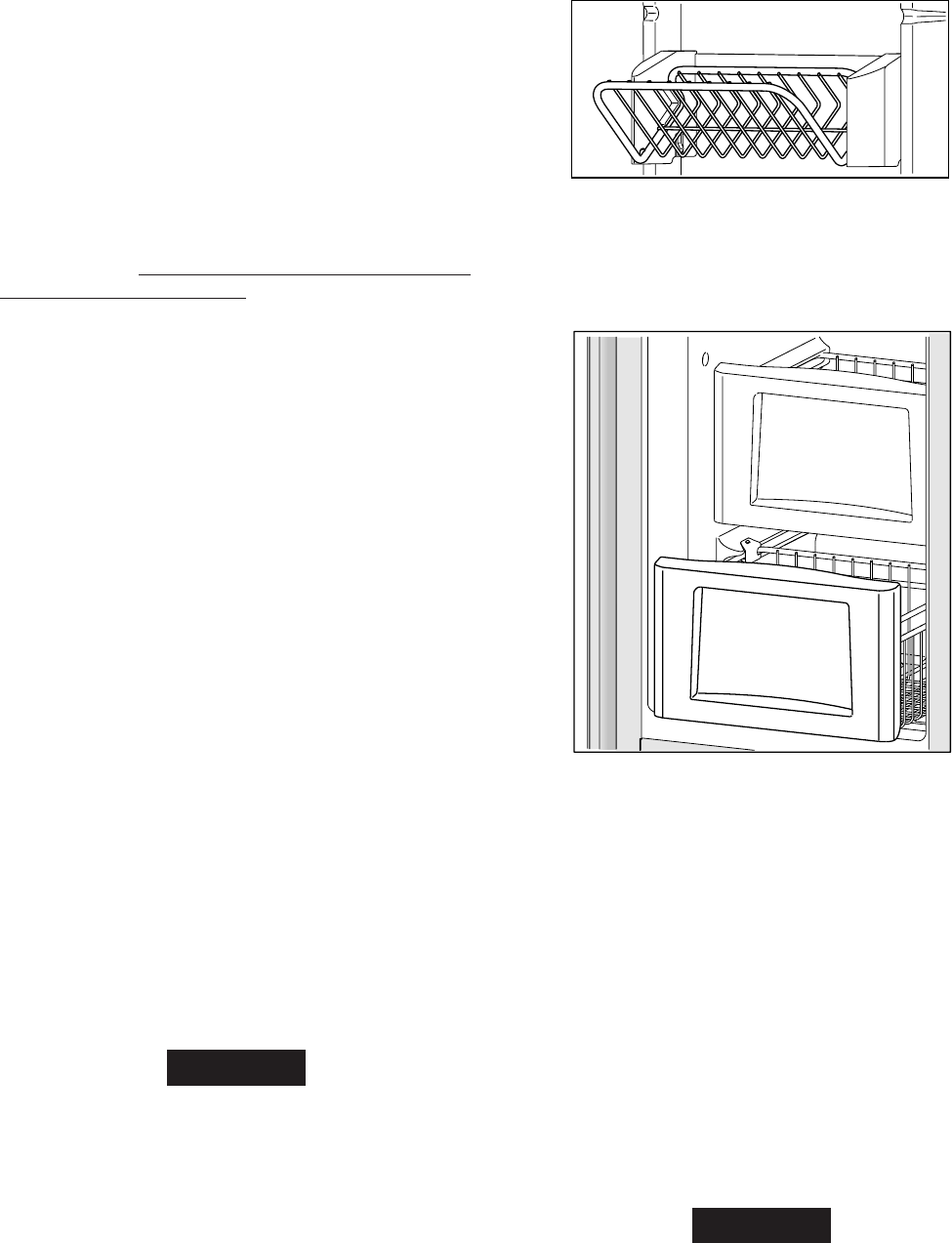
13
HOW TO USE THE REFRIGERATOR
FOOD STORAGE COMPARTMENT
The food storage compartment is completely closed and
unventilated, which is necessary to maintain the required
low temperature for food storage. Consequently, foods
having a strong odor or those that absorb odors easily
should be covered. Vegetables, salads etc. should be
covered to retain their crispness. The coldest positions
in the refrigerator are under the cooling fins and at the
bottom of the refrigerator. The warmer areas are on the
upper door shelves. This should be considered when
placing different types of food in the refrigerator.
When the refrigerator is heavily loaded, it will take a longer
time to lower the temperature; therefore, to get maxi-
mum efficiency the refrigerator and food items should
be precooled prior to loading. The shelves should not be
covered with paper or plastic, and the food items should
be arranged so air can circulate freely.
If you need more space in the refrigerator you can lift up
the front of the second shelf from the top and push the
shelf in, the shelf will fall down against the finned evapo-
rator. This shelf cannot be relocated to a different posi-
tion within the refrigerator.
The middle shelf is a sliding shelf, to slide out grasp the
front of the shelf and pull forward. Push the shelf in to
return to original position. This shelf cannot be relocated
to a different position within the refrigerator.
The lower door shelf is designed for large containers or
bottles (1/2-gallon milk or juice).
FROZEN FOOD STORAGE
COMPARTMENT
This compartment is not designed for deep or quick-
freezing of food. Meat or fish, whether raw or prepared,
can be stored in the frozen food storage compartment
provided they are precooled first in the refrigerator. They
can be stored about three times longer in the frozen food
compartment as compared to the fresh food compart-
ment. To prevent food from drying out, keep it in cov-
ered dishes, containers, plastic bags or wrapped in alu-
minum foil.
Total Refrigerated Volume 14.0 cu.ft.
Freezer door
The freezer door has three wire door baskets for frozen
food items, such as bagged vegetable.
Freezer compartment
The freezer compartment has two sliding wire baskets
for more convenient access to the frozen foods.
CLEANING
Cleaning the refrigerator is usually done after it is de-
frosted or put into storage. To clean the interior liner of
the refrigerator, use lukewarm weak soda solution. Use
only warm water to clean the finned evaporator, ice trays
and shelves. NEVER use strong chemicals or abrasives
to clean these parts, as the protective surfaces will be
damaged. It is important to always keep the refrigerator
clean.
SHUT OFF - STORAGE PROCEDURE
Switch off the refrigerator with the main power ON/OFF
button.
If the refrigerator will not be in operation for a period of
weeks, it should be emptied, defrosted, cleaned and the
doors left ajar. The ice trays should also be dried and
kept outside the cabinet.
! WARNING
! CAUTION
DO NOT use a hot air blower. Permanent damage
could result from warping the metal or plastic parts.
DO NOT use a knife or an ice pick, or other sharp
tools to remove frost from the freezer shelves. They
can create a leak in the ammonia system.
DO NOT store explosive substances in the refrig-
erator, such as cigarette lighter gas, gasoline, ether
or the like.
NOTE: Sodium chromate is used for corrosion protec-
tion (less than 2-weight % of the coolant).


















